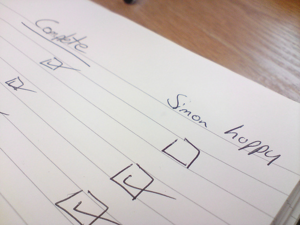Gaining Foundation Skills for Learning and Teaching/GFS Introducing Self and Peer Review Module
If you haven't opened this page in a separate tab you can get back to the original Gaining Foundation Skills page by clicking on the title in small coloured text above.
GFS Introducing Self and Peer Review Module
Self and peer review is an important part of professional development to ensure best practice. It is important to be able to think about and evaluate our own practice as teachers to ensure that we are doing the best that we can to support student learning.
Resources Available

There are a variety of tools available to assist in this process.
Monash University have a great easy to read page on evaluating teaching that touches on self evaluation and explores peer evaluation with links to other resources.
From the site mentioned above the following self evaluation questions consist of a range of questions that assist reflection on a variety of areas including teaching, unit design, research and engagement.
Reflective Practice
Reflective practice is a method for self review and is a concept that is expanded upon in the Creating for Learner Centred Learning Course.
Consider the following passage:
The importance of reflecting on what you are doing, as part of the learning process, has been emphasised by many investigators. …
Donald Schön (1983) suggested that the capacity to reflect on action so as to engage in a process of continuous learning was one of the defining characteristics of professional practice. He argued that the model of professional training which he termed "Technical Rationality"—of charging students up with knowledge in training schools so that they could discharge when they entered the world of practice, perhaps more aptly termed a "battery" model—has never been a particularly good description of how professionals "think in action", and is quite inappropriate to practice in a fast-changing world.
The cultivation of the capacity to reflect in action (while doing something) and on action (after you have done it) has become an important feature of professional training programmes in many disciplines, and its encouragement is seen as a particularly important aspect of the role of the mentor of the beginning professional. Indeed, it can be argued that “real” reflective practice needs another person as mentor or professional supervisor, who can ask appropriate questions to ensure that the reflection goes somewhere, and does not get bogged down in self-justification, self-indulgence or self-pity!
Retrieved on August 16 2008 from http://www.learningandteaching.info/learning/reflecti.htm
